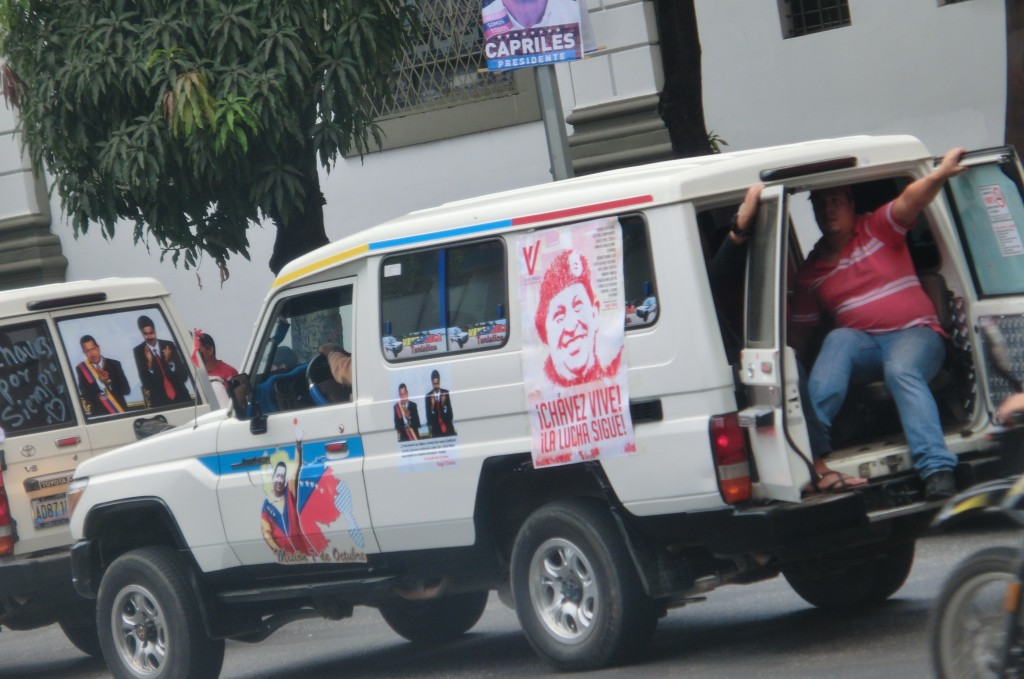CARACAS, Venezuela — On April 11, 2002, a large band of opposition supporters marched on Miraflores — the presidential palace — were met by chavista supporters, and exchanged gunfire meters from where Hugo Chávez and his advisers were sitting. A handful of protestors died and ultimately, in the following hours, Hugo Chávez left power for 47 hours. Right-wing businessman Pedro Cardona shortly took occupation of Miraflores, though his suspension of the National Assembly and failure to secure the support of Venezuela’s army slowly isolated him, and the Venezuelan army itself restored Chávez to power on April 14.![]()
On April 11, 2013, exactly 11 years later, Chávez’s supporters, having freshly mourned their fallen leader last month, will mark the final day of the snap presidential campaign in a massive rally for his successor, acting president Nicolás Maduro, throughout Caracas.
I don’t want to spend too much time rehashing what’s now become history, legend, and political fodder. It’s famously difficult to know just exactly what happened back in 2002, whether it was technically a full golpe (a coup d’etat) or not, the full role of the army in both pushing Chávez (briefly) from power and restoring him, who opened gunfire on whose orders, or even how many people died. But it came in a particularly tense year of transition, and it’s generally accepted that the coup — much like the general strike later that year — came as a result of Chávez’s ultimately successful attempt to assert control over the state-owned oil company, Petroleós de Venezuela, S.A. (PDVSA).
The quintessential film on the subject, despite its pro-Chávez leanings, is a documentary, The Revolution Will Not Be Televised, shot by an Irish film crew that just happened to be in Miraflores working on a piece about Chávez when the April 11 events rapidly spun out of control.
Another account — one that I think gets closer to the heart of the matter, despite the fact that it’s written by someone who has decidedly anti-Chávez sentiments, comes from Francisco Toro, one of the authors of the Caracas Chronicles blog, which posits that both Chávez and his opponents, having played brinksmanship games for months, finally went too far, leaving the Venezuelan army in the middle to keep both sides from escalating the bloodshed that day.
Though it’s eleven years later, and there haven’t been any coup or near-coup attempts since, it’s not without some irony that the anniversary hangs over Venezuela tensely three days before voters decide whether to reward chavismo with another six years in office or to turn to opposition alternative Henrique Capriles.
There’s been some discussion in the Venezuelan media over whether the armed forces are being deployed to help get out the vote for the governing Partido Socialista Unido de Venezuela (PSUV, or United Socialist Party of Venezuela), though military officials have backtracked from that claim in recent days. Capriles in an interview with El Universal earlier this week forcefully argued that Maduro and the PSUV should respect the election results, and cautioned that the armed forces would be responsible to ensure a peaceful transition. Though Chávez managed to commingle politics into every aspect of the state — from PDVSA to the central bank to state government — the military has retained relatively more of a patina of independence from politics than other state institutions.
Polls, which are not quite accurate in Venezuela, gave Maduro an edge in the leadup to the election, but that doesn’t mean Capriles is hopeless — he won a tough reelection as the governor of Miranda state in an otherwise dismal set of regional elections in December 2012 after placing just 11% behind Chávez in the October 2012 election — a better showing than any of Chávez’s rivals stretching back to 1998. Maduro is no Chávez, and since the 2012 presidential election, Venezuela’s economy has only gotten worse, and there’s been no appreciable improvement in the standard of living, some of the continent’s worst crime and power shortages throughout the country.
Because everyone assumes that Maduro will somehow find enough votes to win the election, no one really knows how easily Maduro and the chavistas would transfer power. Continue reading Venezuela marks coup anniversary in leadup to election
